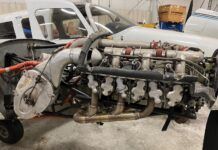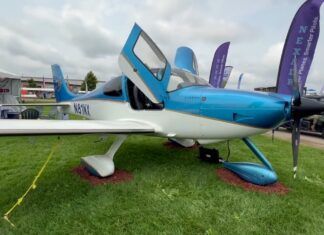The first question that came to mind when Jack Riley, Jr., president of RAM Aircraft Corporation, told us about his latest product was this: Does the aviation world really need a $48 throw-away oil filter?
Perhaps a better question would be do we need a better oil filter that costs $48? Anyway you look at it, the high price will be the stumbling block for many, no matter how big an improvement this new filter provides, if indeed better filtration matters.
But make no mistake, by all appearances and laboratory tests, the new RAM replacement for the ubiquitous Champion CH48108 through CH48111 spin-on oil filters (available for only about $12 each from discount suppliers) does provide significantly better filtering of your oil. The Champ line has long been the standard for spin on filtration.
The relevance of RAMs better mousetrap and whether it really makes a difference in the long run is a question we’ll get to, but first lets take a closer look at RAMs new super-filter.
Making Engines Last
The genesis for the filter is Rileys continuing crusade to ensure that his rebuilt TSIO-520 Continental engines make it to TBO.
Give Riley credit for being one of the few in the industry who has taken to heart the ultimate business truth, that there is no better advertisement than a happy customer and that warranty costs are far more expensive than just cash laid out, itself potentially not insignificant.
As he sees it, the best way to keep his engine customers satisfied with rebuilds that have cost them a handsome sum is for them to not have any problems before they reach TBO. Theoretically, that saves RAM money, too, since fussing with warranties is time consuming and expensive.
Somewhere along the line, Riley came to the conclusion, later confirmed by others, that the standard Champion filter had shortcomings that could affect engine life. The primary deficiencies relate to both the quality of filtering and to the bypass valve setting.
It turns out, according to separate independent laboratory tests paid for by RAM and Airwolf Filter Corp., a manufacturer of remote mounted spin-on filter adapters, that the Champ filter doesnt do a very good job filtering out 20-micron and smaller particles. (A micron is one millionth of a meter or about 0.00004 inch.)
The tests, performed to the latest industry standards, show that the Champ filtered only 36 percent of 20 micron particles, 26 percent of 15 micron and 13 percent of 10 micron. Continuing in 5 micron intervals, its only at 50 microns that the Champ filter exceeds 95 percent, with a 96 percent rating.
It also turns out that while the Type Certificate data sheets for the TSIO-520 require a 20 micron filter, they don’t list a particular standard to meet.
One has to wonder if Continental had in mind only 36 percent filtration when they set that 20 micron standard, to say nothing of how Champion can claim to supply a 20 micron filter when it obviously isn’t?
A bypass valve is required so that in case the filter becomes clogged for any reason, the pressure wont build to the point to cause a failure of the filter or, more likely, its gasket, resulting in loss of oil and possible engine failure.
However, you also don’t want the bypass valve to open at too low a pressure or it may result in a significant lack of filtration as the oil bypasses the filter for extended periods.
Tests-again, done by an independent lab, show the Champ filters bypass valve generally starts to open at as low as 6.6 PSID (pounds per square inch differential) with full bypass occurring at between 8 to 11 PSID. The Continental TC spec, a minimum, says 12 to 16 PSID.
There’s evidence that the Champ filter, in some instances, operates in bypass mode for extended periods because of the small margin between the normal backpressure caused by the filter medium itself and other causes, such as minimal particle clogging or even oil congealed by colder oil temps.
RAMs Solution
RAMs simple answer to the Champ filters failings is a filter that filters better and has a higher bypass setting. In tests funded by RAM and conducted by Fluid Technologies, Inc., a well-respected independent fluid testing lab, the RAM filter proved to be 46 percent effective at the 5 micron range, reaching 95 percent at 15 microns and 99.9 percent effective at the magic 20-micron size.
The bypass has been set to start opening at 20 PSID and to be fully open at 25 PSID. Riley says their tests have confirmed that there’s is plenty of safety margin before gasket failure, let alone filter failure, even at this higher setting.
The RAM oil filter is sized in height midway between the long and short Champ filters. Internally, the filter is comprised of 56 pleats of a fiberglass media contained between fine steel mesh while the original Champ filter uses a plain pleated paper filter media.
One question that arises immediately is this: If this improved filter filters oil better, wont it clog easier? Riley explains that their limited experience indicates that it wont, probably a combination of the increased filter area in the fiberglass media and the higher bypass setting.
Because of the higher bypass setting, a clogged filter should be readily apparent, indicated by a noticeable drop in oil pressure on the cockpit gauge. Tests have confirmed this to be the case.
Initially, RAM is calling for filter replacement at 50 hours or when a sustained 10 PSI pressure drop is indicated. Riley anticipates that may be upped to 100 hours once more experience is gained.
RAM put 130 hours on a filter installed in the company Turbo 210 with minimal pressure drop. Note that this filter doesnt obviate the need for 25 or 50 hour oil changes, as appropriate.
At this writing, the filter is approved only for Continental IO- and TSIO-520 series engines. RAMs Riley says he plans to go after more approvals in the future, as quickly as he can get them through the forest-denuding FAA STC process.
First will be the geared GTSIO-520, then the Airwolf & Aviation Development Corp. remote mount filter STCs, the IO-550 and then Lycomings.
What Champion Says
Naturally, with their old standby spin ons under attack by RAM and by other aftermarket companies, we thought Champion would be spoiling to shoot down the high-flying claims with their own data.
But no. Repeated calls to Champion headquarters yielded not a peep from the company. Hey guys, nothing to say?
Do You Need This?
The remaining question revolves around the need for a filter this effective.
With very few exceptions, cam lobes being the most critical, clearances in an aircraft engine are large enough that some 20-to 40-micron particles in the oil arent likely to cause a significant problem. Theyre simply too small to contact the wear surfaces in significantly large volume to cause apparent problems. Plenty of engines make TBO or beyond with no filter whatsoever, just a metal screen that strains out the big chunks.
And those relatively few engines that don’t make TBO often appear to crump for reasons unrelated to wear or damage from particles in the oil, unless cylinder wear is oil related. Some insist that it is, others say cooling and leaning are the biggest variable in cylinder wear.
Egregious lubrication failures are usually caused by lack of oil, clogged lines or galleries and the like and these tend to show up as blued or failed bearings and journals. These happen, of course, but are hardly everyday failures, in our experience. Cylinder problems are far more common.
Frequent oil changes, in the opinion of many engine experts, are probably one of the least expensive and effective means of ensuring that lubrication isn’t an issue in engine life.
Even RAM acknowledges that this super-filter doesnt change that. Also, we know of no convincing data correlating either filtration efficiency or oil particle contamination with engine wear, at least in aircraft engines. The conventional wisdom is that aircraft engines have much looser tolerances than car engines and are thus less susceptible to small-particle wear patterns.
But Airwolfs John Kochy tells us that this is true only cylinder tolerances. Main, rod and cam wear surface tolerances are very close to if not identical to automobile standards.
Kochy says definitive data developed by the automobile industry shows that particles in the 10 to 20 micron range cause most oil-related wear.
He believes that research applies directly to aircraft engines. And when you get right down to it, there’s something to be said for making sure the oil is as clean as possible, even if it is only because it makes you feel better about it.
Its probably true that all it takes is one particle in the wrong place at the wrong time in combination with other factors to ruin your day or shorten your engines life. Maybe its like not being able to be too thin or too rich. Maybe oil cant be too clean. So, were back to the price-$48 each.
For the aircraft operator who is compulsive about maintenance, its maybe a small price to pay for additional peace of mind, though nearly a dollar an hour additional in engine operating expense is not insignificant for many owners.
If RAM comes to recommend a 100 hour filter change interval, or even better, some manner of on-condition requirement based on the pressure drop, then this would change the cost equation significantly.
Still more expensive, but not nearly so and far easier to swallow from a what-can-it-hurt point of view. At about 50 cents an hour, it would be difficult to argue against viewing a pricier filter as reasonable insurance.
Bottom line, we cant suggest that this super-filter is essential or something you just cant live without. Lab tests are one thing, real world experience quite another. That said, all indications are that this filter performs as advertised.
Based on the data provided to us, the Champion filter doesnt do a particularly good job and there’s nothing except the cost to argue against using the better performing RAM filter.
When (or if) these filters are available for Lycomings, we’ll try some long term wear metal tests on the company Mooney.
Until then, we’ll withhold judgment on whether its worth four times the cost of the lowly Champion.
Also With This Article
Click here to view “Filter Gizmos: Convenience More Than Cleanliness.”
Click here to view the Checklist.
by Douglas S. Ritter
Douglas S. Ritter is an Aviation Consumer contributing editor.




